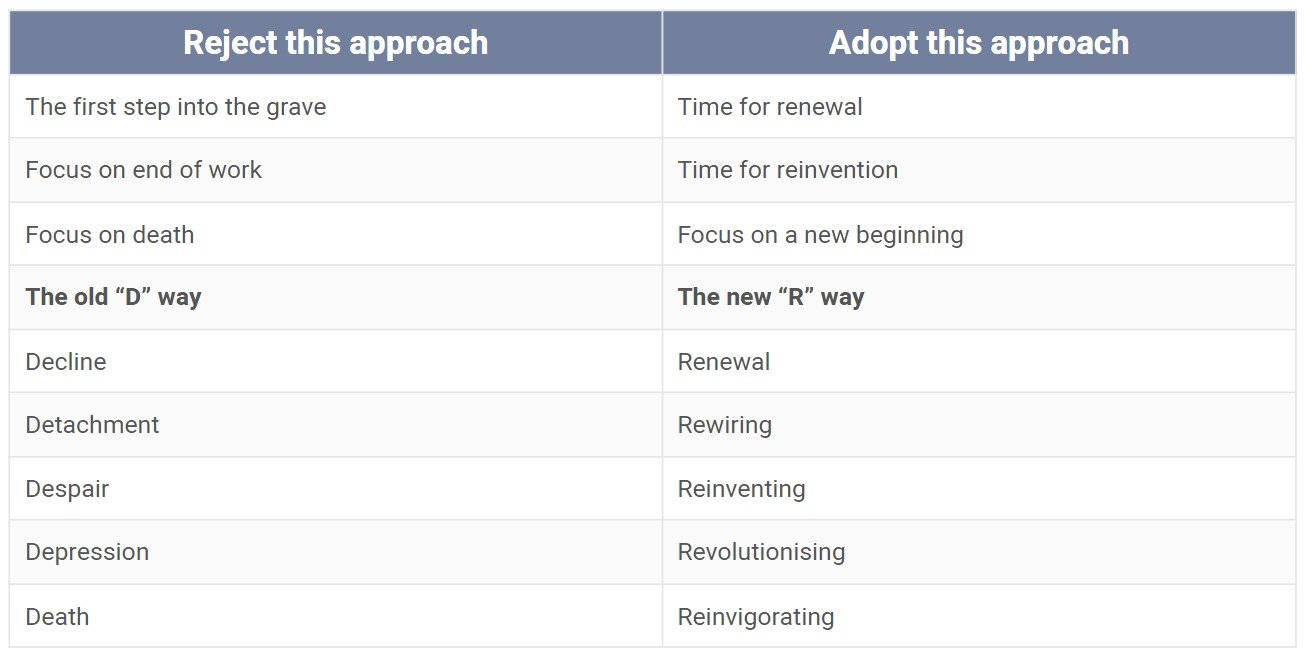POSITIVE PSYCHOLOGY FOR RETIREMENT AND SUCCESSFUL AGEING
A healthy mindset can help us see that reaching retirement doesn’t have to mean being frail and old, but rather as the privilege of being vital and healthy for longer.
The foundation of “successful ageing” dates back to 1950 when John Rowe (MD) and Robert Kahn (Ph.D) published the book Successful Aging. Their book played a pivotal role in changing the stigma surrounding old age and helped move the conversation from disease and decline to a much-needed narrative about the positive aspects of growing older.
Initially, Rowe and Kahn’s work likened successful ageing to the absence of disease, however, they later revised their theory to include cognitive and lifestyle issues.
Rowe and Kahn propagated the belief that one’s lifestyle is defined as:
Delaying disease and disability (not just the absence of disease);
Maintaining physical activity and mental functioning; and
Involvement in social engagement leads to successful ageing.
Although their concept was widely welcomed and acknowledged, they did have a fair amount of criticism. One of which was that one needs sufficient money to afford healthcare and successful ageing activities. Although this is true, I believe that one can go a long way by merely adjusting your lifestyle in a manner that does not cost loads of money. Exercising can be free, and eating healthy can be cheap, it does not have to be expensive. Most problems in later life are the result of bad habits, i.e., eating badly, not exercising and mind-inactivity.
In my previous articles, I alluded to the PERMA(F) concept, and this article follows from there. I am not going to delve into PERMA(F) again, but there may be some points that I touch on here that were mentioned previously. All these articles are about positive psychology, so there will be some overlapping.
In the 1950s, ‘60s and ‘70s, middle age was considered to be between 40 and 50. Today, thanks to advances in medical care and lifestyle changes, middle age is now considered to be between 55 and 75 – also referred to as “the second adulthood” that can be full and vital, even if a person has chronic conditions or terminal illness.
My father passed away in 1977 of a heart attack when he was 53 and I was 17. I cannot remember a time (maybe when I was in pre-school or very early in primary school) that I saw him as young and agile, he was always an “old toppie”, as were the parents of all my friends. Today the narrative is completely different. Today I know many seventy “plus-ers” who are the envy of people much younger than them. Not because of genes but because of the lifestyle they choose to live.
Rather than refer to “today’s 60 as the new 40 and today’s 70 as the new 50”, as many people do, let’s rather call today’s 60 the new 60 and today’s 70 the new 70. We were 40 and 50 (some years ago) and we were damn good at it. Now let’s make 60 and beyond count!
The 21st Century is a time of possibilities and vitality, not just decline!
So how does this ‘magical retirement lifestyle’ look?
At the outset, I want to state that mental health is as important as physical health. Depression and anxiety are just as detrimental to one’s health as poor eating habits and lack of exercise. I mentioned on more than one occasion in past articles that loneliness is twice as lethal as obesity. The importance of social support in retirement is grossly underestimated.
Move from what can go wrong to what can go right
What makes life worth living?
This can mean different things to different people. For those fortunate enough to have grandchildren, it may mean spending time with them.
For others, it can be a stroll on the beach or in the park with your dogs or fellow retirees at sunrise or sunset. For some, it may be something much bigger; it doesn’t matter. Sit down and write down all the good things currently in your life and those that you want in your life. In my previous article, I referred to finding your flow. Find your flow and enjoy life.
Let’s thrive, not only survive
Whatever you do, do it with gusto. While you approach everything you do with vigour, encourage those around you to do the same. Compliment others for their efforts, irrespective of how insignificant it may seem to you. What may be a trivial task for you might be a mountain to cross for others. Encouragement and compliments go a long way.
Worry about what you can control and ignore the rest
We tend to get so bogged down with problems and issues that we can do nothing about. Know about them but don’t try and solve them (unless you can).
Commit to a regular exercise programme
Set up something in your community. Play sport, get outside, join a walking group or a cycling group (if you can still manage to cycle), join a bowling club, meet people, chit-chat, and just have fun while you are doing it. However, the emphasis must be on exercise, which means that you must spend meaningful time getting the heart pumping and muscles straining. Blood flow leads to healthier muscles, more durability, and cognitive maintenance.
Find an activity that can feed your mind
This can range from studying, playing chess or bridge, playing mind games, etc. (sorry, TV doesn’t count). There are plenty of options, and we need to keep the grey matter simmering.
Get your social networking into gear
People need people. I mentioned before that we are pack animals; find your tribe and become a key member of your tribe. The quality of your friendships is crucial. Mere numbers are meaningless. Loneliness is the enemy of the aged. Don’t allow yourself to fall into the despair of loneliness, and please help others not to be lonely either, be their tribe.
Commit to adopting the following stance on retirement:
The 21st Century is a time of possibilities and vitality and not just decline. It’s empowering to own the years of life and experience that we have rather than compare ourselves to younger people as we age.
Longevity has resulted in “bonus years” of 20-30 years beyond retirement age. Some people think this means being old and frail for longer. Let’s make it our goal to have a shorter period of being old and frail and a longer time of being as vital and as healthy as possible.
On my new website, which I hope to launch soon, I refer to “creating your bumper sticker”. It is entertaining to hear some of the comments when I mention this to people close to or in retirement. The idea is to think about life in retirement and create your slogan. What message would you stick on your car’s bumper to tell the world about yourself and your approach to retirement?
Go ahead, create your bumper sticker!



